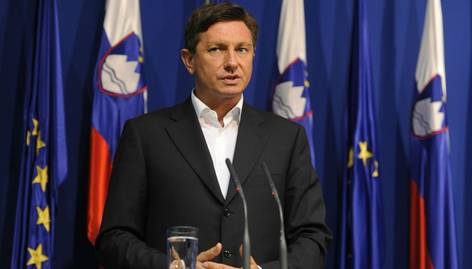NEWS
Prime Minister's press conference following the Government's 136th session
After the 136th regular Government session, Prime Minister Borut Pahor commented on the arrest of Hague indictee Ratko Mladič, saying that it is one of a series of very important steps forward made by Serbia and Serbian President Boris Tadić. He added that Mladić's arrest might be a step forward towards reconciliation in the area badly affected by the war. Prime Minister Pahor highlighted dialogue that took place this year between Belgrade and Pristina, also upon the encouragement by Slovenia. Serbia took part in the Brdo Process for the first time, with Kosovo representatives also present, and has made considerable progress on forging closer ties with the European Union.
With regard to offering help to refugees fleeing North Africa, Prime Minister Pahor said that the EU's Interior Ministers had not yet come to a decision on activating a mechanism for offering help in humanitarian crises since, for the time being, the migrant inflow is under control and there is no need to do so. He added that Slovenia would help to the best of its abilities should this decision be taken. 'I have always been and will remain an advocate for humanitarian aid,' said the Prime Minister, stressing that Slovenia had opted not to take part in NATO air strikes or ground operations in Libya.
Prime Minister Pahor also responded to the payment of annual leave bonuses in companies in which the state is the majority shareholder and whose operations are far from excellent. He considered that annual leave bonuses in these companies were unjustified, and the Government has established that such conduct is inappropriate. Next week, the Capital Assets Management Agency of the Republic of Slovenia will also have to give its opinion on the issue. Prime Minister Pahor went on to say that 'the aforementioned bonuses are in conflict with the resolutions adopted by the Government last year, calling on state-owned companies to behave in a more sustainable manner in view of the crisis, the recession and the already adopted Lahovnik's Act.' He announced that he would send a letter to the President of the Council of the Capital Assets Management Agency, Alja Markovič Čas, confirming the Government's visit to the Agency in the coming week. He further stated that he hoped that the Agency would provide its opinion on annual leave bonuses and decide on any measures to be taken with regard to the matter. He clearly took the view that the Government has no right to influence the Agency's decisions.
At today's session, the Government also agreed on the text of the law amending the Corporate Income Tax Act, which sets out two principal solutions. Both refer to the exemption from the calculation, deduction and payment of withholding tax on income originating in Slovenia. According to the first solution, payments made by Slovenia pursuant to Article 83 of the Public Finance Act will be exempt from taxation at source. These are payments of interest to the borrower on funds provided by the borrower as a cover for borrowing the state's debt securities. The other solution contained in the amendment refers to exemption from withholding tax on possible payments stemming from guarantees of the Republic of Slovenia pursuant to the Act on guarantees of the Republic of Slovenia for the purpose of maintaining financial stability in the euro area within a temporary mechanism to preserve financial stability, i.e. the European Financial Stability Facility (EFSF).
The ministers also adopted the Report on implementing intervention laws regarding the labour market. The report encompasses the effects of the Act on Partial Subsidising of Full-Time Jobs and the Act on Partial Reimbursement of Payment Compensation. The Act on Partial Subsidising of Full-Time Jobs is aimed at limiting the effects of the world economic crisis and preserving jobs; it enables employers to receive subsidies for partially financing the salaries of their full-time employees whose number of hours per week has been decreased from 40 to 36 hours or who have been guaranteed a decrease from 35 to 32 hours of work per week. The Act on Partial Reimbursement of Payment Compensation is aimed, in particular, at reducing the effects of the world economic crisis, preserving jobs, increasing the employability of workers by raising the level of qualifications, and improving the competitiveness of employers.




